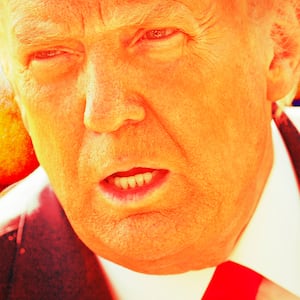As Donald Trump prepares to play the role of Republican kingmaker and continue on as the party’s hyper-spiteful, self-interested leader, he has been inundated with requests for endorsements—both from GOP stalwarts to help them retake the House and Senate in next year’s midterms and from prospective candidates looking to unseat or succeed their fellow Republican lawmakers. And of course, the ex-president has his demands and conditions.
Once he and his remaining advisers start vetting conservative candidates or a possible slate of MAGA primary challengers in earnest, Trump has told several people he prefers to back candidates who haven’t ever conceded he lost the 2020 election, according to two sources familiar with the matter. If a potential candidate seeking Trump’s support has a proven record of saying Trump lost and that the months-long push to overturn the 2020 election was a mistake, that could be a nonstarter, the former president has said in recent weeks.
Reached for comment on Wednesday evening, senior Trump adviser Jason Miller said, “No official criteria has been set yet for endorsements from President Trump.”
Naturally, he also wants the Trump-approved candidates to make fighting election “fraud” a top priority in their campaigning, the two sources said. In reality, there is zero evidence that any of the widespread voter or election “fraud” conspiracies that Trump, his lieutenants, and much of the GOP mainstream claim occurred last year actually happened. After the election in November was initially and correctly called for the Democratic nominee Joe Biden, Trump, along with his lawyers and staunch allies, embarked on a long and increasingly authoritarian crusade to try to nullify Biden’s decisive victory and keep Trump in power. These efforts culminated in the bloody Jan. 6 riot at the U.S. Capitol, when Trump supporters tried to stop Congress certifying Biden's electoral win. Trump’s role in instigating the mob violence led to his second impeachment.
On the day and immediate aftermath of the rioting, various high-profile Republicans expressed disgust, with some openly blaming Trump for the violence and trying to distance themselves as quickly as possible from him. It took mere days for almost all of them to come crawling back to the former president, however, as more and more of the party’s elite realized that Trump’s popularity and vast influence in the GOP remained intact even after Jan. 6.
And with his iron grip on the Republican Party all but guaranteed for the foreseeable future, the former president isn’t satisfied with simply remaining the primary driver of the GOP’s agenda and public image. He wishes to codify his anti-democratic “Big Lie” of the 2020 election as part of the official positions of his party, and wants to essentially make the publicly voiced belief of the lie a political litmus test. And so far, his party, as well as the conservative movement and right-wing media, are more than willing to help him do it, body count be damned.
This week, the 2021 Conservative Political Action Conference (CPAC) features panels on the usual right-wing culture war topics like “censorship” and “cancel culture”—but the spotlight at the annual convention is focused squarely on pushing the Big Lie that the election was somehow “stolen” from Trump with four separate panels on “protecting elections” dedicated to the conspiracy theory. The former president is himself scheduled to speak on Sunday, in a speech that his boosters are trying to bill as the big “coming out” for the next phase of his political life, and as a reassertion of his dominance in the GOP. According to two people who’ve discussed preparations for the address with Trump, the ex-president is planning to use his CPAC speaking slot in part to declare, once again, that he won the 2020 presidential election. (He clearly didn’t.)
According to another source familiar with Trump’s upcoming CPAC speech, he will bring up the 2020 election as a way to also pivot to and discuss the crackdowns, restrictions, and “reforms” that he believes Republicans should pursue and enact ahead of the 2022 and 2024 elections.
The panels at this year’s CPAC also include an appearance by Cleta Mitchell, a former Trump campaign attorney who resigned from her job at Foley & Lardner after the firm said it was “concerned” to learn about her role in helping President Trump try to overturn the election. Mitchell’s panel includes comments from Jenny Beth Martin, the founder of Tea Party Patriots, which the Jan. 6 “Stop the Steal” organizers listed as a partner in organizing the Washington, D.C., rally that led to the riot. The panel will address what organizers called the “Failed States” of Pennsylvania, Georgia, and Nevada—where, in reality, the Trump legal team and its allies failed to get the legitimate election results thrown out.
A separate panel on “protecting elections” (dubbed “Why Judges & Media Refused to Look at the Evidence”) features Alabama Rep. Mo Brooks, who spoke at the Jan. 6 “Stop the Steal” rally in Washington and urged “patriots” in attendance to “start taking down names and kicking ass”—comments which prompted House Democrats to introduce a resolution to censure the Alabama Republican. Brooks will appear alongside Adam Laxalt, a former Republican attorney general in Nevada and Trump campaign staffer who falsely claimed that noncitizens voted in the 2020 election and sued the state to overturn Biden’s victory there.
Matt Schlapp, formerly a top Trump surrogate and the current chair of the American Conservative Union that organizes CPAC, telegraphed that Trump’s election lie would feature prominently at the conference during an appearance on CNN this week and still clung to the myth of titanic 2020 fraud, despite prodding from host Chris Cuomo. “There was widespread voter fraud in the last election,” Schlapp said, shrugging off the dozens of lawsuits the Trump campaign and its allies lost.
“Just because you fail in court doesn’t mean you don’t have a good case,” Schlapp argued.
And as CPAC and its conservative speakers push the Big Lie down in Florida, House Republicans in the nation’s capital are finding it hard to avoid the claim, much less denounce it. During an appearance on ABC’s This Week on Sunday, Rep. Steve Scalise repeatedly refused to say that the 2020 election was not “stolen” when pressed by host Jonathan Karl.
Last week, Florida Rep. Matt Gaetz, another diehard supporter and adviser of the former president, attended a workshop focused on training conservative activists to lobby state and local governments against the use and purchase of voting machines like the ones manufactured by Dominion Voting Systems. Trump-connected lawyers such as Rudy Giuliani, Sidney Powell, and Lin Wood made Dominion the focus of bizarre conspiracy theories involving Venezuela and other alleged actors, prompting billion-dollar defamation lawsuits targeting several Trumpworld luminaries.
Most of these Trump allies who’ve been getting sued or legally threatened by voting-tech companies lately were only doing what Trump told them to do.
Polls show that Republican voters have increasingly embraced conspiracy theories about the 2020 election. A USA Today/Suffolk Poll published on Sunday showed 73 percent of Trump voters believe President Biden was not legitimately elected.
That belief appears to be spurring GOP lawmakers to action, as well—not to reduce fraud, but to limit legal voting. A new study by the Brennan Center for Justice shows that state lawmakers have introduced 253 bills to restrict voting rights in 43 states since Biden won the election.
Updated 2/25, 11:00 AM for clarity.









